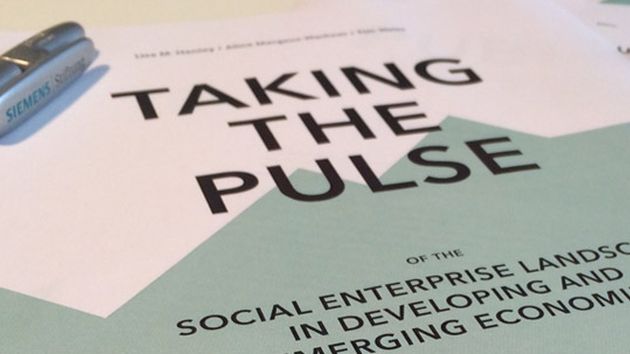Social enterprises have been seen for years as a source of hope in solving social problems in developing and emerging economies. Socially innovative business models are meant to help solve social ills in a sustainable way and create organizations that can remain up and running without donations. A study published by Zeppelin University and Siemens Stiftung provides data for the first time on evaluating the ability of social enterprises to satisfy the basic needs of low-income people. The dynamics in the public, private, and third sectors were also examined, as well as to what extent these influence the activities of social enterprises.
The study shows that social enterprises are dependent on bringing in a large portion of their income through the direct sale of products and services to end consumers. Over half of the social enterprises indicated they received no support from public institutions and at times were even hindered in achieving their goals. “Funding for social enterprises is mainly in the hands of the private sector and civil society stakeholders, which only cooperate with each other to a certain extent in this regard. In light of this, social enterprises are limited in how they can serve the lowest income classes and work in sectors that offer less potential for profitability – sectors that are particularly connected with the basic needs of people,” explains Dr. Lisa M. Hanley, who conducted the two-year study together with Aline Margaux Wachner and Tim Weiss from the Civil Society Center | CiSoC at the ZU.
At the same time, a shift has taken place in the last decade regarding the role of private sector approaches to solving social problems in developing and emerging economies. Market orientation has become widespread in development cooperation. “Stakeholders from the public, private, and third sectors are increasingly giving their funds to profitable companies rather than public or nonprofit organizations,” explains Aline Margaux Wachner. The results of the study reflect this trend: While the share of non-profit organizations in the portfolios of social investors has sunk, a strong increase can be seen in private social enterprises as well as organizations that combine nonprofit and for-profit legal structures (known as hybrid structures).
Finally, the study shows that social entrepreneurs who receive financing from social investors tend to be members of the educational elite in the countries examined. The majority have an advanced degree. “This can be traced back to the complex challenges in the management of social enterprises and reflects the strong private sector focus of social investors,” explains Tim Weiss.
Based on the results of the study, ZU researchers have made a number of recommendations to enable social enterprises in developing and emerging countries to put their financially sustainable business models into practice while protecting their social goals at the same time. To this end, alternative sources of income such as long-term supply contracts with social enterprises are necessary to give organizations the opportunity to also serve very low-income people. Beyond that, the researchers recommend stronger cooperation between supporters of the public, private, and civil society sectors to optimally utilize the strengths of each sector and redefine outdated funding structures in development cooperation. To protect non-profit social enterprises, action is required on the part of social investors in particular to provide more innovative financing instruments for non-profit social entrepreneurs. Many social problems do not initially lend themselves to a profitable solution or require several years of preparation to establish markets. Non-profit legal forms play a key role here.
The results of the study are based on a survey of 36 social investors and 286 social enterprises from Colombia, Mexico, Kenya, and South Africa. The study comes from the International Research Network on Social Economic Empowerment (IRENE | SEE), which was established in 2011 by ZU and Siemens Stiftung. The goal of the project is researching organizational approaches that contribute to social and economic empowerment – seen in this context as the process of economic self-empowerment through professional assistance. The main emphasis is on entrepreneurial solutions for social problems provided, for example, by social enterprises, which have been increasingly discussed in the last decades as a promising addition to traditional development cooperation.
Zeppelin University and Civil Society Center | CiSoC
Zeppelin University (ZU) is a privately-endowed institution of higher education, officially recognized by the federal state of Baden-Württemberg and accredited by the German Council of Science and Humanities since 2003. As a “university between business, culture and politics” with 1,184 students, 52 professors and just under 285 staff at present, it consequently undertakes both education and research in an interdisciplinary, individualized and international spirit. The university has been recognized with many awards; among others from Stifterverband für die Deutsche Wissenschaft and Stiftung Mercator for outstanding commitment to society. In the relevant rankings, it has been placed in the leading group since its inception.
The Civil Society Center | CiSoC was established in 2010 to undertake research into social innovations, social developments, and social enterprises in particular, and has since then conducted several studies with financial support from numerous foundations such as Stiftung Mercator, Siemens Stiftung, the European Commission, Kreditanstalt für Wiederaufbau (KfW), and Caritas. Currently, with five staff headed by Prof. Dr. Stephan A. Jansen and many international partner universities, it runs national and international empirical projects in post-graduate programs. The Zeppelin University staff working on the International Research Network on Social Economic Empowerment (IRENE | SEE) is composed of Dr. Lisa M. Hanley (project manager), Aline Margaux Wachner, and Tim Weiss (Ph.D. candidates).



